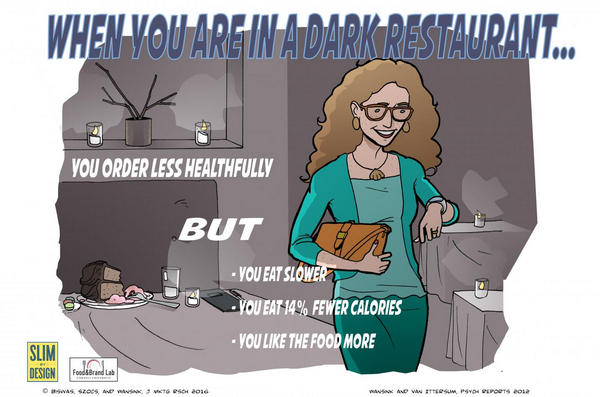Dining in dimly lit restaurants has been linked to eating slowly and ultimately eating less than in brighter restaurants, but does lighting also impact how healthfully we order?
New research findings forthcoming in theJournal of Marketing Research illustrate that those dining in well-lit rooms are about 16-24% more likely to order healthy foods than those in dimly lit rooms. Furthermore, the researchers found evidence that this effect is due mainly to the level of diners' alertness. "We feel more alert in brighter rooms and therefore tend to make more healthful, forward-thinking decisions," explains lead author Dipayan Biswas, PhD, University of South Florida.
 |
|
Diners are 16-24% more likely to order healthy food in well-lit restaurants. Research published in the Journal of Marketing Research (2016) by Dipyan Biswas, Courtney Szocs, Brian Wansink (Director of the Cornell Food and Brand Lab) and Roder Chacko. (Image Credit of Daniel Miller) |
First, the researchers surveyed 160 restaurant patrons at four casual chain restaurant locations. Half of those diners, who were seated in brighter rooms, were more likely to choose healthier options (such as grilled/baked fish, vegetables or white meat) over relatively unhealthy items (such as fried food or dessert). Furthermore, sales records showed that those in dimly lit rooms actually ordered 39% more calories! In four additional lab studies involving 700 college-aged students in total, the researchers replicated these results.
The follow-up studies also showed that when diners' alertness was increased with the use of a caffeine placebo or by simply giving a prompt to be alert, those in dimly lit rooms were just as likely as their peers in brightly lit rooms to make more healthful food choices. From this, the researchers conclude that the main reason that we make healthier choices in well-lit spaces is because we feel more alert.
Lighting is used to create ambience and enhance the dining experience, which is why many restaurants have dim lights. "Dim lighting isn't all bad," says co-author Brian Wansink, PhD, Director of the Cornell Food and Brand Lab and author of Slim by Design: Mindless Eating Solutions for Everyday Life, "despite ordering less-healthy foods, you actually end up eating slower, eating less and enjoying the food more." So, what's the real take-away here? According to Dr. Wansink, doing what you can to make yourself feel alert is the best way to avoid overindulging when "dining-in-the-dark."





 CN
TW
EN
CN
TW
EN






